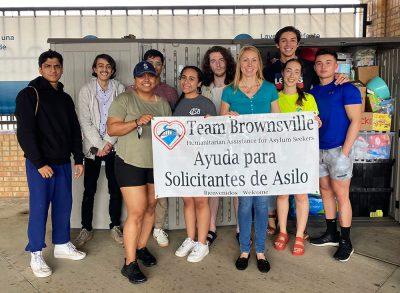With modern technology, it’s often easy to read about issues happening around the world while remaining detached. But a group of Boston University students wanted to tackle issues head on and traveled down to the Texas-Mexico border to witness the immigration crisis themselves.

The students traveled as a part of the Border Studies Program, organized by BU’s Initiative on Forced Displacement. Throughout the weeklong trip, held during spring break, students traveled to a variety of locations along the Lower Rio Grande Valley including Brownsville and McAllen in Texas, and Matamoros and Reynosa in Mexico.
Muhammad Zaman, a co-founder of IFD and professor of biomedical engineering, said the goal of the program was to debunk the notion that the forced displacement crisis was limited to “low and middle income countries far from our home.”
“This is a problem at home as well, in the United States, and we have sort of both a moral responsibility to understand and reflect on it,” Zaman said.
The program, initially scheduled for winter break but postponed due to COVID-19, allowed students to “observe and analyze the rich culture and complex challenges faced by migrants” and was coordinated in partnership with the Rio Valley Relief Project and the Refugee Services of Texas, according to the IFD website.
The trip began with conversation and volunteer work with the co-founders of an organization called Team Brownsville, which supports immigrants recently released from detention. The group then attended a conference at the University of Texas about the mental health trauma of immigrants.
Carrie Preston, co-founder of IFD and a professor of english and gender & sexuality studies who attended the trip, said it was important to depart from the “virtual intensives” when planning this year’s program, to allow it to “focus closer to home.”
“Through the experience of being there, talking to people in person, having the opportunity to ask questions, to observe firsthand the work rather than just getting a description of it and then actually to put their own bodies to use helping asylum seekers and migrants,” Preston said. “I think they gain a very different perspective on the crisis.”
Over the course of the trip, volunteer work was completed in La Posada Shelter, The National Butterfly Center and LUPE — a united farm workers group.
When visiting the border wall site, Preston approached a Custom and Border Patrol officer to see if he was willing to answer some questions, as they had been unable to schedule a conversation with any officers when planning the trip. The officer agreed.
“It was an opportunity that I think was really, really important because we had not been able to get that perspective, the perspective of someone whose job is to police the border,” she said. “And it added a lot to our understanding,”
Libby McClelland, a junior in the College of Arts and Sciences, attended the trip because of her interest in global health, and because she wanted to go “beyond the classroom.”
“For me, one of the memorable moments was during a conference [Latino Behavioral Health Disparities in the COVID-19 Era] we attended where we heard from Dr. Luis Zayas on trauma in the migration process and family separation,” she wrote in an email. “The thing that stuck particularly in my mind was when he was talking about how he was using his research to make a difference.”
Zaman, who helped plan the program but did not attend, said these trips are often “really transformative” and in previous instances students have used their experience as a “point of self-reflection,” basing their senior capstone projects or theses on it.
“In general, what happens is that when students come back, some of them are angry at the injustices and want to do something about it,” he said. “Others have a much deeper sense of their privilege and want to reflect on it.”
When talking to organizations in Texas, such as the Humanitarian Rescue Center, McClelland said the students “found that a possible avenue for student impact could be grant-writing,” as they could do it remotely when they return to Boston.
“I’m hoping to explore this possibility as I continue working with the Initiative as well as continue to think about and have conversations around student impact, voluntourism, and research exploitation,” McClelland wrote.
Continuing to create change after the trip is difficult given the scale of the problem Preston said, but on top of continuing partnerships, improving the program and donating, the initiative hopes to spread awareness.
“Many, many people in this country believe that the migrants we met in the shelters are illegal, you’ll hear this all the time,” Preston said. “In fact, it’s absolutely legal for someone to cross a border and ask for asylum which is what these migrants are trying to do.”























































































































